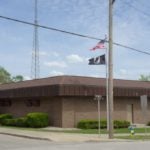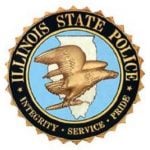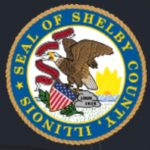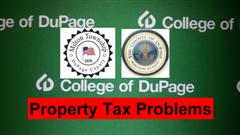College of DuPage (ECWd) –
The College of DuPage is a public body and its real estate is generally tax exempt – with the exception of certain leaseholds to businesses that operate within COD’s footprint.
This issue is not new to us, as we have advocated for proper accountability on real estate taxes for years (here, here, and here) and this is simply a continuation of that effort.
When a local government owns property that is tax exempt, and then allows businesses or individuals to lease part or all of that property, it is no longer being used exclusively for public purposes and the leased portion must be taxed.
Sometimes, as appears to be the case with the College of DuPage, they attempt to bypass this requirement by using terms such as “license agreement” or “service contract” to make people think it is not a lease for property, but the Illinois Department of Revenue and the Courts have previously determined that it does not matter what terms are used in the paperwork, it is still considered a “lease” for property tax purposes. COD has reported the leasehold of the college bookstore and that is being taxed appropriately, however, we have not been able to confirm as of the date of this publication whether the book store paid the college for the taxes, or if the college paid it on their own (payments here). If they can report the book store lease why not report the other leases?
Who is responsible for paying the property taxes on leasehold property? The entity holding the lease – not the public body. Additionally, the property itself cannot be taken, sold, or be subject to a lien due to non-payment of leasehold property taxes.
US Bank has a “license agreement“, which I will refer to as a lease, that gives them exclusive rights to the portions of COD property where their business and teller machines are located (read about the agreement here). That agreement requires them to pay any property taxes, should a tax bill be received.
The Issue With COD and Real Estate Taxes
The College of DuPage is familiar with the provisions of the Property Tax Code that require them to be truthful and report any leaseholds, or other items, that might make their real estate become subject to taxes. They have done this with the book store, but have so far failed to submit the required paperwork for the US Bank branch and all of its teller machines.
To be fair to US Bank, they are not the only ones in this situation and it is not the bank’s responsibility to notify the assessor’s office. Subway, Wholly Habaneros, Chick Fil A, Simply to Go, Starbucks, Einstein Bagels, Eatery 425 are just a few more locations on campus. The Waterleaf might be questionable depending on how the Department of Revenue sees it.
The College of DuPage is responsible for notifying the assessor’s office when there is a change in status with their real estate and they must certify that either the status did not change, or that it did and supply a copy of the lease(s) on an annual basis. This was obviously not accomplished correctly and any verification is based on a false information.
Convenient oversight to benefit COD Foundation Board Member’s employer?
The lease agreement with US Bank specifically states that the bank will be responsible for any property taxes, and if the college gets billed the bank is required to pay them. The problem is that the college never acknowledged to the assessor that there was a lease, and consequentially, no tax bill was sent out. Any tax bills “should” go to the leaseholder, not the college.
Responses to various FOIA requests for records indicate that the college has not notified the assessor of any leaseholds, and therefore, no assessments have been sent.
The Milton Township Assessor put it quite well by saying “The Milton Township Assessor’s office never received a parcel allocation or division for the U.S. Bank. Consequently, because there was not a parcel split notifying this office, nor has the College of DuPage expressed a leasehold interest, the U.S. Bank on the College of DuPage campus has not been assessed.“
Milton Township’s Assessor appears to take these things seriously as he also stated “We do our best to ensure all properties are on the tax rolls and having been alerted to the U.S. Bank and other entities within the College of DuPage campus we are working diligently to add those properties to the tax rolls for 2015.”
I will ask him to bill them for back taxes also, since he has the power to do just that.
The bottom line here, as with all of the other articles about COD, is that they continuously get in front of the public and tout how good their internal controls are, yet they consistently fail.
A Look At The Documents used in this article:
2014 Re-Certification list of COD property that is 100% tax exempt, click here.
PTAX-300 Form, Application for Non-Homestead Property Tax Exemption and the related Certificate issued by IDOR, click here.
Property Tax payments since 2010, click here.
2013 Property Tax Bill, click here.
FOIA Request to DuPage County Supervisor of Assessments (here) and Milton Township (here).
Relevant portion of the Tax Code:
(35 ILCS 200/9-195)
Sec. 9-195. Leasing of exempt property.
(a) Except as provided in Sections 15-35, 15-55, 15-60, 15-100, 15-103, 15-160, and 15-185, when property which is exempt from taxation is leased to another whose property is not exempt, and the leasing of which does not make the property taxable, the leasehold estate and the appurtenances shall be listed as the property of the lessee thereof, or his or her assignee. Taxes on that property shall be collected in the same manner as on property that is not exempt, and the lessee shall be liable for those taxes. However, no tax lien shall attach to the exempt real estate. The changes made by this amendatory Act of 1997 and by this amendatory Act of the 91st General Assembly are declaratory of existing law and shall not be construed as a new enactment. The changes made by Public Acts 88-221 and 88-420 that are incorporated into this Section by this amendatory Act of 1993 are declarative of existing law and are not a new enactment.
This article used records provided thru public records requests.








1 Comment
Tipster
Posted at 14:10h, 09 Marchhttp://m.bizjournals.com/chicago/news/2013/08/07/us-bank-taps-robert-breuder-for.html?r=full